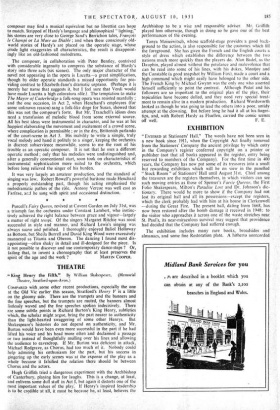MUSIC
Tess of the d'Urbervilles is an obvious operatic subject, has indeed been used for an opera ; but The Mayqr of Casterbridge has not, to my knowledge, been attempted until this year, when Peter Tran- chell wrote the opera which I heard at the Cambridge Arts Theatre last week. The difficulty about Hardy, from the operatic com- poser's point of view, is that both his characters and his stories are often conventional, even thin, unless illuminated by Hardy's poetic sense of language and atmosphere—a sense for which a happy composer may find a musical equivalent but no librettist can hope to match. Stripped of Hardy's language and philosophical " lighting," his stories are very close to George Sand's Berrichon tales, Francois le Chatnpi or La Mare au Diable ; and when these consciously old- world stories of Hardy's are placed on the operatic stage, whose crude light exaggerates all characteristics, the result is disappoint- ingly like an old-fashioned melodrama.
The composer, in collaboration with Peter Bentley, contrived with considerable ingenuity to compress the substance of Hardy's story into three acts (six scenes). The only major character of the novel not appearing in the opera is Lucetta—a great simplification,
though by older operatic standards a missed opportunity for pro- viding contrast to Elizabeth-Jane's dramatic soprano. (Perhaps it is merely her name that suggests it, but I feel sure that Verdi would have made Lucetta a high coloratura role.) The temptation to make The Mayor of Casterbridge a folk-song opera was resisted manfully ; and the one occasion, in Act 2, when Henchard's employees (for some unknown reason).sang a folk-like dirge for Susan, showed that this was not the composer's forte. But Mr. Tranchell's idiom does need a transfusion of melodic blood from some external source. All his best ideas were instrumental in character, and he was at his happiest elaborating the movement and excitement of a crowd scene, where complication is permissible ; or in the dry, Brittenish parlando of the court-scene in Act 3. His inability to write a simple, truly vocal melody and hand it politely to a singer, keeping the orchestra in discreet subservience meanwhile, seems to me the root of his trouble as an operatic composer. It is not that he uses a different operatic method ; only that his melodies were undistinguished and, after a generally conventional start, soon took on characteristics of instrumental sophistication more suited to the orchestra, which before long relieved the singer of his burden.
It was very largely an amateur production, and the standard of singing was low. Robert Rowell's powerful baritone made Henchard a properly outstanding pail, though his acting emphasised the melodramatic pathos of the role. Antony Vercoe was well cast as Farfrae, and he sang with spirit and occasional distinction. •
* * Purcell's Fairy Queen, revived at Covent Garden on July 31st, was a triumph for...the orchestra under Constant Lambert, who instinc- tively achieved the right balance between grace and vigour—largely a matter of right tempi. Of the singers Margaret Ritchie was most successful in style and manner,'-and Richard Lewis's singing was always suave and polished. I thoroughly enjoyed Baliol Holloway as Bottom, but Sheila Burrell and David King Wood were excessively mannered as Titania and Oberon. The dancing I found most dis- appointing—often shaky in detail and ill-designed for the piece. Is it not possible to discover and use contemporary dance-steps ? Or, failing that, to invent a choreography that at least preserves the
spirit of the age and the work ? MARTIN COOPER.































 Previous page
Previous page